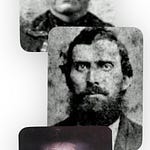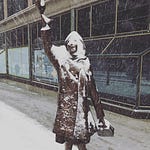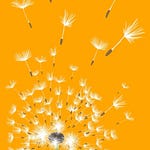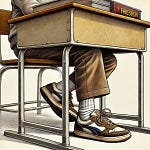If you’re under 30, stop reading—I don’t want to spoil the plot. After a while, life can feel predictable. You sense déjà vu. The faces may change, even the geography, but there’s a dawning awareness that you may never have another truly new experience again. You’ve been here before, and you’ll be here again. Initiation, assimilation, creation, dissolution, initiation again—ups and downs, crashes and burns, resurrections; problems, solutions, resolutions, fresh problems—the quest for THE answer, disillusionment, and the quest for the REAL TRUE answer. Escaping home, only to duplicate home, leaving once more.
You ask, is life the circle T.S. Eliot described when he spoke of returning to the place you began, but knowing it for the first time? After slaying your monsters on your Hero’s Quest, what then? Is life a dead-end road or a cycle forever passing through the same stages or steps or phases laid out in your Psych 101 text? But perhaps each time you cycle through, you experience a deeper, more profound depth of enlightenment. Is success to be scaled like Maslow’s hierarchy or measured by accumulation and possession?
In my 20s, I sought these answers in all the best places. I handed my money to top transformational technology gurus, believing self-confidence, self-esteem, self-awareness, self-differentiation, self-actualization—anything with a “self” attached—would save me. Gestaltists, Rolfers, LSD soul-regression, rebirthing, past lives, Est, reflexology, iridology, kinesiology, Reiki, chanting, drumming, sweat lodges—I even lived on a personal growth, clothes-optional commune in California for three months. They all offered great highs. Each time, I was sure I had found the answers. That was part of the problem—I got high on answers. I became addicted to answers and the gurus who sold them. But each answer was followed by a crash into a sinkhole of depression. Everything changed, yet nothing changed. I was still me. As they say, you can rearrange the fruit, but the bowl remains the same.
When I was 44, my father visited, and like him I had become a successful businessman. He spent three days with my partner and me, and a devastating realization struck. Despite coming out as gay, moving a thousand miles away, sobering up, confronting our family dysfunctions, and vowing never to be like him, I found myself living his life. I was in his house in his neighborhood, working his job, planning for his retirement, even living with my mother, though he was a man. Driving Dad to the airport, I felt as if it should be me getting on plane and going back to Mississippi. By then, there were no surprises in our lives—just a linear progression of accumulation. The only questions left were how much more and how much longer. Quantity, not quality.
My dad and me - different fruit, same bowl.
The one thing I hadn’t tried was living outside the bowl—rejecting the belief that my purpose was to achieve something, be something, hold onto something. People, possessions, career, a fully explored self, enlightenment, all were supposed to add up to fulfillment, to meaning.
In the deepest, darkest part of me, I feared that without these things, I was merely an attractive container for what I’d accumulated—a pretty wrapper without substance.
Maybe it comes with age, but I discovered I had been asking the wrong questions. Instead of “what am I here to do, have, or be?” I needed to start with, “what am I?” And it had nothing to do with bowls of fruit.
When I finally released that container—the job, the house, the partner, all my self-help books—I rejoiced to discover none of it defined me. I was what remained. I was emptied but I was enough.
Years of writing followed—for no reason other than I loved it. I accumulated nothing but a larger vocabulary, living in a two-room flat like a hermit. I was excited each morning as I began and fulfilled each evening when I finished; even my lack of talent didn’t matter; writing badly brought a joy that excelling in what I hated never did. While writing, I hardly thought about myself at all. I found “self” to be highly overrated. Most of my thoughts weren’t even mine—they were scaffolding for a life I never wanted but looked good doing.
In letting go, I found peace—not in answers or achievements, but in the stillness of self and the simplicity of being.
It lasted until I was told I was “good” at writing.
Getting published and the recognition it brought became a double-edged sword. I quickly filled up that bowl again. My talent became another commodity, and writing became another product. I wrote to meet other people’s expectations. I was back to arranging fruit. I had put my soul to work in a factory until it went on strike, and the assembly line of words ground to a halt. You make some promises to yourself that can’t be broken without consequences.
So, here I am, back at the bowl, all the space filled with self. I long for that fecund, generative emptiness. That’s why I’m telling you this today: not for your approval, your money, your love, your respect, or your compassion. I’m emptying out again, word by word, as I would to a trusted friend.
Through it all, I’ve learned one truth about life: A key to a meaningful existence seems to be creating empty spaces and trusting the universe to fill them.
.














